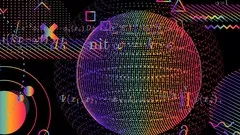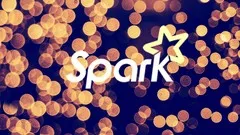
Quantum Computing : A Comprehensive Beginners Guide 
This course is your gateway to the foundations of quantum computing, starting with the fundamental unit - the qubit. Explore qubit notation, matrix representation, and the famous Bloch sphere. An in-depth study of single-qubit gates such as X, Hadamard, Y, Z, S, and T gates, along with their symbols and matrices. Enter the realm of multi-qubit gates, including CNOT, CZ, Swap, and Toffoli gates. Discover the groundbreaking concept of entanglement, delve deeper into Bell states, and end your adventure with ultra-dense encoding—a technique for transmitting multiple classical bits using just one qubit. You'll develop the skills to build quantum applications through a combination of theoretical and practical exercises using the popular quantum computing framework Qiskit. By the end of the course, you will have a firm grasp of the basic concepts and tools to embark on an exciting journey into quantum computing. Get ready for the adventure of a lifetime! ▼
ADVERTISEMENT
Course Feature
![]() Cost:
Cost:
Paid
![]() Provider:
Provider:
Udemy
![]() Certificate:
Certificate:
Paid Certification
![]() Language:
Language:
English
![]() Start Date:
Start Date:
2023-05-04
Course Overview
❗The content presented here is sourced directly from Udemy platform. For comprehensive course details, including enrollment information, simply click on the 'Go to class' link on our website.
Updated in [September 05th, 2023]
Skills and Knowledge Acquisition:
1. Qubit Basics: Understand the fundamental concept of qubits, the quantum equivalent of classical bits.
2. Qubit Notation: Learn how to notate qubits and their quantum states effectively.
3. Matrix Representation: Explore the matrix representation of qubits, including vector notation and the renowned Bloch sphere.
4. Single-Qubit Gates: Gain proficiency in using essential single-qubit gates, such as X gate, Hadamard gate, Y gate, Z gate, S gate, and T gate.
5. Gate Notations: Comprehend gate notations and matrix representations associated with various single-qubit gates.
6. Multiple Qubit Gates: Explore the world of multiple qubit gates, including the CNOT gate, CZ gate, Swap gate, and Toffoli gate.
7. Gate Operations: Understand the operations and applications of multiple qubit gates in quantum computing.
8. Entanglement: Delve into the groundbreaking concept of entanglement, a key feature that distinguishes quantum computing.
9. Bell's State: Learn about Bell's state, a fundamental quantum phenomenon.
10. Superdense Coding: Explore the intriguing concept of superdense coding, allowing the transmission of multiple classical bits using only a single qubit.
11. Practical Qiskit Exercises: Apply theoretical knowledge through practical exercises using Qiskit, a popular quantum computing framework.
12. Quantum Programming Skills: Develop the skills needed to begin programming quantum applications.
Contribution to Professional Growth:
- Quantum Fundamentals: Acquire a solid foundation in quantum computing principles and concepts.
- Programming Proficiency: Gain practical experience in programming quantum applications using Qiskit.
- Problem-Solving Skills: Develop problem-solving abilities relevant to quantum computing challenges.
- Quantum Literacy: Enhance your understanding of the unique properties and capabilities of quantum systems.
- Quantum Technology: Prepare for a career or role in quantum technology, quantum software development, or quantum algorithm design.
- Innovation Potential: Be ready to contribute to groundbreaking advancements in quantum computing.
- Interdisciplinary Skills: Bridge the gap between quantum physics, mathematics, and computer science.
- Research Opportunities: Lay the groundwork for participation in quantum computing research initiatives.
- Competitive Advantage: Stand out in the evolving quantum technology job market.
Suitability for Preparing Further Education:
- Quantum Specialization: Ideal for learners interested in pursuing specialized quantum computing programs or certifications.
- Advanced Quantum Studies: Acts as a stepping stone for individuals aspiring to delve deeper into advanced quantum computing coursework.
- Quantum Career Path: Suitable for those planning a future in quantum computing, whether in academia, industry, or research.
- Quantum Research: Provides a strong foundation for pursuing advanced studies or research in quantum computing.
- Quantum Programming Skills: Equips students with the skills necessary for further exploration of quantum software development.
- Cross-Disciplinary Learning: Relevant for learners aiming to bridge the gap between quantum theory, mathematics, and practical quantum computing.
Course Syllabus
Math prerequisites
Qubit
Quantum gates: Single quantum gates
Multiple Qubit
Multiple qubit gates
Coding: Qiskit
Application
Course Provider

Provider Udemy's Stats at AZClass
Discussion and Reviews
0.0 (Based on 0 reviews)
Explore Similar Online Courses

Spark Starter Kit

Quantum Computing in Python using Qiskit

Python for Informatics: Exploring Information

Social Network Analysis

Introduction to Systematic Review and Meta-Analysis

The Analytics Edge

DCO042 - Python For Informatics

Causal Diagrams: Draw Your Assumptions Before Your Conclusions

Whole genome sequencing of bacterial genomes - tools and applications

The Fundamentals of Quantum Computing

Fundamentals of Cloud Computing and Quantum Computing


Start your review of Quantum Computing : A Comprehensive Beginners Guide